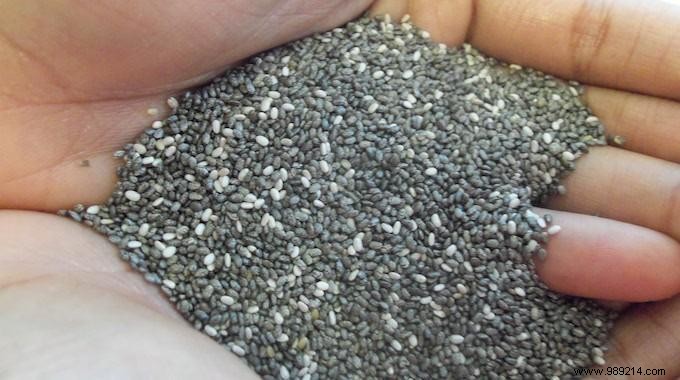
For millennia, chia seeds have been one of the staple foods of the South American food.
But in the Western world, it's only in recent years that chia seeds have gained prominence.
So why are these little seeds considered a “superfood”?
And, most importantly, in what ways will they improve your health? Discover the 10 benefits of chia seeds.

Research is currently underway to investigate the effectiveness of chia seeds as a treatment for type 2 diabetes (because they have a slowing effect on the digestive tract).
In addition, chia seeds form a gelatinous layer when in contact with liquid, which prevents the level of sugar in your blood from making sudden rises.
One of the benefits of chia seeds is that they are high in fiber, which could not be more beneficial for the overall health of your digestive tract.
In addition, they can be a natural remedy for constipation. They help reduce inflammation and keep cholesterol down.
Know that it only takes a very small amount of chia seeds, only 28 g, to provide 1/3 of the recommended daily intake of fiber for an adult.
These seeds may be tiny, but they have an incredible power:to make you feel full longer. In other words, your feeling of having eaten well lasts longer. As a result, you have less desire to snack between meals.
There are 2 explanations for this benefit. On the one hand, the seeds stick together on contact with a liquid to form a kind of jelly. This results in an increase in the volume of seeds in your digestive system (like rice, for example).
On the other hand, chia seeds contain the amino acid tryptophan. This amino acid regulates your appetite (and also improves your mood and prepares you for sleep).
Chia seeds have a high calcium content. This makes them incredibly beneficial for health and strengthens the strength of teeth and bones.
A single serving of chia seeds provides 18% of the recommended daily intake of calcium. For information, 1 portion of chia seeds corresponds to 100 g.
Chia seeds are perfect for vegans and people with egg allergies.
Thanks to its gelatinous properties in contact with a liquid (mentioned above), chia seeds are an ideal replacement for eggs for pastry recipes.
To prepare chia seeds as an egg substitute, simply mix 1 tablespoon of chia seeds with 3 tablespoons of water. Then, let stand 15 min and you're done!
Gluten intolerance is an increasingly important problem in our societies.
Luckily, chia seeds have the texture and goodness of cereals — but without any trace of gluten!
Chia seeds also have a high protein content, but without containing cholesterol.
Protein should be a priority in your diet.
They help the body form new cells and play a structural role in tissue function. These are essential functions for our survival.
One serving of chia seeds contains approximately 10% of your recommended daily protein intake. This is impressive, since in general most protein-rich foods are meat-based.
Chia seeds have a high antioxidant content. This is one of its most important virtues. This means they can fight cancer and heart disease.
They also preserve your skin, giving it a youthful and healthy appearance.
People who have a high intake of antioxidants are 40% less likely to get pancreatic cancer. They also reduce the risk of a heart attack by 29%.
I know we just mentioned reducing your risk of heart attack, but chia seeds are good for your heart health for another reason.
This superfood also regulates your blood pressure — thanks to its high antioxidant content.
Therefore, people with a high intake of antioxidants are 46% less likely to be prone to high blood pressure.
Chia seeds also contain healthy doses of omega-3 fatty acids. Know that omega-3 fatty acid must be part of your diet because it helps your brain function and well-being.
Additionally, omega-3 fatty acid also works as an anti-inflammatory and can fight depression, diabetes, obesity, and osteoarthritis.
You can find chia seeds in organic stores or buy them online here.
Have you tried using chia seeds? Let us know in the comments if it works for you. We can't wait to read you!